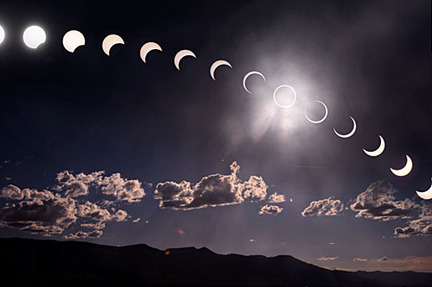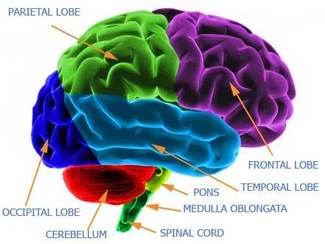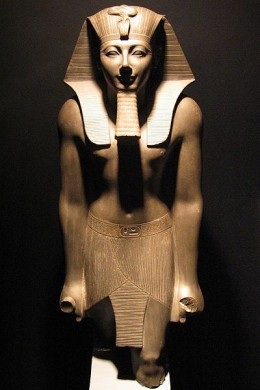 Composite photo of a solar eclipse taken outside of Doyle, California. (Click for link)
Composite photo of a solar eclipse taken outside of Doyle, California. (Click for link) The problem, of course, is that this is not so easy. We are all apt to lose our spiritual center in the midst of everyday activities. We are prone to falling back into habits born out of anxiety, fear and desire, rather than those nurtured from our highest hopes and aspirations. It's hard to be godly 24/7.
And then, there is this: It is not clear that we would want to live with constant "God consciousness," even if we could. There are limits to how much we can take of God's presence in our lives. In order to function in this imperfect world, there are times when we have to allow ourselves to experience fear and stress, to give in to some of our cravings, and to play out our anxieties. We can try to do this in a mindful way — noticing what we are doing while we are doing it — but, ultimately, we need to be human. We are not angels.
There is a language for talking about this balance in Jewish tradition. The rabbis of the Talmud talk about the "Or Ganuz," the Hidden Light that is the remnant of the light of the first day of creation. This is not the ordinary light shed by the sun and moon. (Remember, they were not created until the fourth day). Rather, this is the light of ultimate wisdom and of God's presence in the world. According to the rabbis, this is the light by which one could see from one end of creation to the other. This is the light that God "wears like a garment" (Psalms 104:2). This is the light that God had to hide from the world when human beings entered creation.
Why? Because we are not ready for it. Because we would be blinded by it. Because we could not function in this reality if we were constantly in the midst of such light. The Or Ganuz is the Jewish metaphor for the way that God is hidden and revealed at the same time, with just the right amount peaking around the corners of our lives when we are able to see it.
In his great work, Kedushat Levi, the Chasidic master Levi Yitzchak of Berdichev wrote about this hidden, supernal light in connection to this week's Torah portion (Bo). In the story of the Exodus, the ninth plague that God brought down on Egypt was a plague of darkness — darkness so thick that it could be touched. Yet, throughout the three days of darkness, the Israelites continued to "enjoy light in their dwellings" (Exodus 10:21-23). According to Levi Yitzchak, the palpable darkness that the Egyptians experienced was the screen that God brings into the world to prevent the Hidden Light from blinding us.
God, says Levi Yitzchak, allows us to see exactly as much of the Hidden Light as we are capable of perceiving. Most of the creatures of the world, he says, have a set and unchanging amount of the Or Ganuz that they merit to see. Yet, for Israel, Torah and mitzvot are a path that allow us to grow in the amount of God's light available to us. As we grow in our capacity for compassion, our awe for the miracles that surround us, and our drive to make the world a better place, our light grows.
This is why the Torah says that "all the Israelites enjoyed light in their dwellings," rather than saying "for all the Israelites, there was no darkness." The latter phrase, expressed in the negative, would have been parallel to the earlier declaration that, "not a head of the livestock of Israel had died," in the fifth plague (Exodus 9:7), or, "where the Israelites lived, there was no hail," in the seventh plague (Exodus 9:26). By stating positively that the Israelites enjoyed light while the Egyptians suffered darkness, according to Levi Yitchak, the Torah emphasizes that the Israelites took the positive action of performing mitzvot to lift themselves to higher and higher levels of light.
The Egyptians, on the other hand, who were unrepentant of oppressing the Israelites even after the first eight plagues, had nothing to lift them out of this darkness. For them, the screen that hid God's light from them was the only reality.
Modern readers of the Torah may see Levi Yitzchak's reading as overreach. The concept of the Or Ganuz, the Hidden Light of the first day of creation, is a rabbinic interpretation. There is no reason to believe that the original readers of the Torah would have connected the light of Creation to the lights that the Israelites enjoyed during the eighth plague. Yet, Levi Yitzchak's reading does make spiritual sense, if not literary or historical sense. We do find that our ability to perceive God's presence in the world is connected to our devotion to doing the things that connect us to God.
When I use my time and energies to comfort people who are in pain, I feel like I am rewarded by being able to peer more deeply into the recesses of life's hidden meaning. When I celebrate joyously with others in their holy moments, I feel a little bit of the light shining on me. We expand our world and the world of life's truest treasures when we engage in acts of holiness.
Such light comes to us in small increments. We human beings may be too fragile creatures to experience more than a glimpse of the divine light, and there are parts of us that need to be shaded from it if we are to survive this material existence. But we still yearn for the light that burns. We take comfort in knowing that, through our actions and intentions, we can grow from strength to strength, and merit the opportunity to live more fully in the light.
Other Posts on This Topic:
The Blind and the Light
Havdalah



 RSS Feed
RSS Feed
